(ENG/ESP)Koinonia
Review of the book Koinonia published by St. Joseph Major Seminary, Ikot Ekpene
I first came across the book Koinonia in the most unexpected yet deeply meaningful way. A seminarian from St. Joseph Major Seminary, Ikot Ekpene, visited my parish one Sunday morning. He came not only to attend Mass but also to advertise and sell copies of a publication titled Koinonia. At first, I wasn't quite sure what the book was about. The word itself, Koinonia, sounded both ancient and spiritual, something rooted in tradition but still relevant today. I was drawn in by the way the seminarian spoke of it, with a calm conviction, like someone who had not only read it but lived through its message.
So I bought a copy.
From the very first few pages, I could sense this wasn't just an ordinary seminary publication. It wasn't written just for seminarians or theological experts. It felt personal. It felt like a call to remember what Christian life is supposed to be at its core, fellowship. True, honest, godly fellowship. The type of communion that doesn’t begin and end with the sign of peace at Mass, but one that flows into our everyday lives. One that transforms how we relate with one another, with the Church, and with God.
The book is a collection of essays and reflections, mostly written by seminarians and formators of St. Joseph Major Seminary. Each contribution felt like a window into the heart of seminary life and a sincere attempt to invite readers into a deeper understanding of Christian unity and love. Topics ranged from the theological foundation of koinonia to its practical application in community life, pastoral work, and personal spirituality. Some chapters leaned more towards academic analysis, while others were purely reflective, making the book balanced and easy to connect with.
What I loved the most was the sincerity of the voices. You could feel the wrestling of the writers, some of them speaking from places of experience, others from hope, and still others from pain. One of the reflections that stayed with me the most was about the struggle of building genuine brotherhood in community life. The writer talked about how easy it is to pretend to be united, to act nice on the surface while harbouring envy, jealousy, or bitterness inside. He admitted to times when he had failed to be a true brother to others and how much grace it took to start over. That was so raw and real. I think all of us have been there in our own circles, whether in family, friendship, school, or even the Church.
There was also a powerful chapter on the Eucharist as the center of koinonia. The writer explained how the breaking of bread is not just a ritual but a shared life. He described the altar as the place where God brings people of different backgrounds together and makes them one body. Reading that reminded me of my parish community, especially how diverse we are and yet how we all kneel before the same table, hungry for the same love.1xzz
The language of the book is simple but thoughtful. It's the kind of writing that doesn’t try to show off intelligence but speaks directly to the heart. You don’t need to have studied theology to understand what the authors are saying. The book invites you to sit down, reflect, and ask yourself honest questions: Am I really living out the call to communion? Am I open to others? Am I truly part of the Body of Christ, or just a passive observer?
I also appreciated that the book didn’t shy away from hard truths. It pointed out how easy it is to fake community, how our world today is becoming more individualistic, and how even in Church circles, we can isolate ourselves emotionally. It challenged me to stop being comfortable with surface-level relationships and to invest in deeper, spirit-led connections.
Buying this book felt like more than just supporting a seminarian’s project. It felt like responding to a call. A call to build, to share, to forgive, and to love sincerely. And it came at the right time too. I was going through a season where I felt isolated even while surrounded by people. Koinonia reminded me that communion isn’t about proximity, it’s about intention. It’s about choosing to show up fully in the lives of others.
As I flipped the last page, I didn’t just close a book—I stepped into a renewed awareness. A new resolve. I’m now more intentional about how I interact with people, especially in Church. I try to ask people how they’re really doing and actually wait to hear them out. I don’t brush off the quiet ones anymore. I greet more warmly. I listen more. Koinonia isn’t just a title anymore, it’s become a way of life.
To anyone who comes across this book, I strongly encourage you to get a copy. Whether you're a parishioner, a seminarian, a religious sister, or someone just curious about faith, Koinonia has something for you. It doesn’t give all the answers but it gives you enough to begin asking the right questions and enough strength to begin again where you may have failed.
This isn’t just a seminary publication. It’s a gift. A mirror. A compass. And I’m deeply grateful I boughtes it that daykb
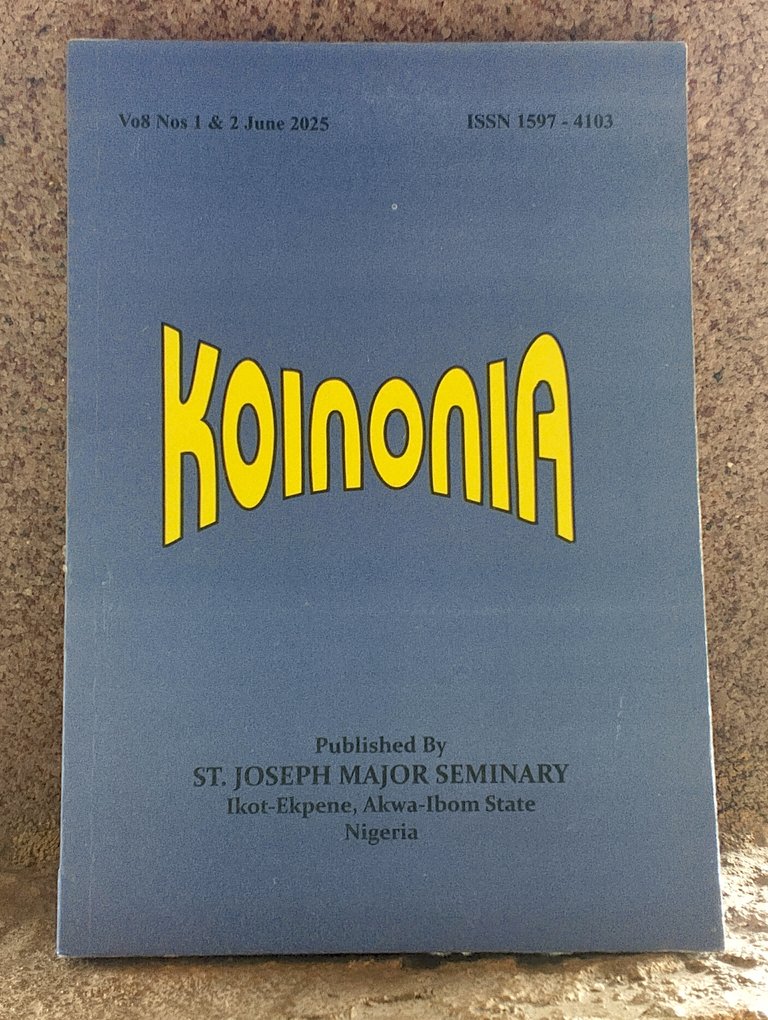
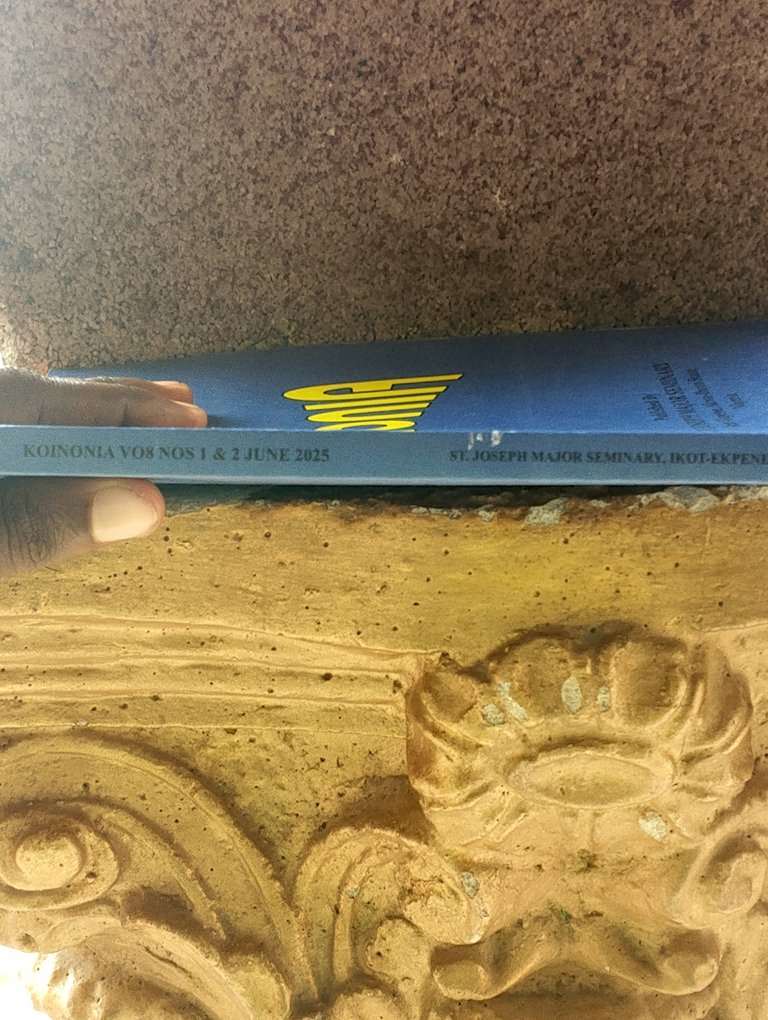
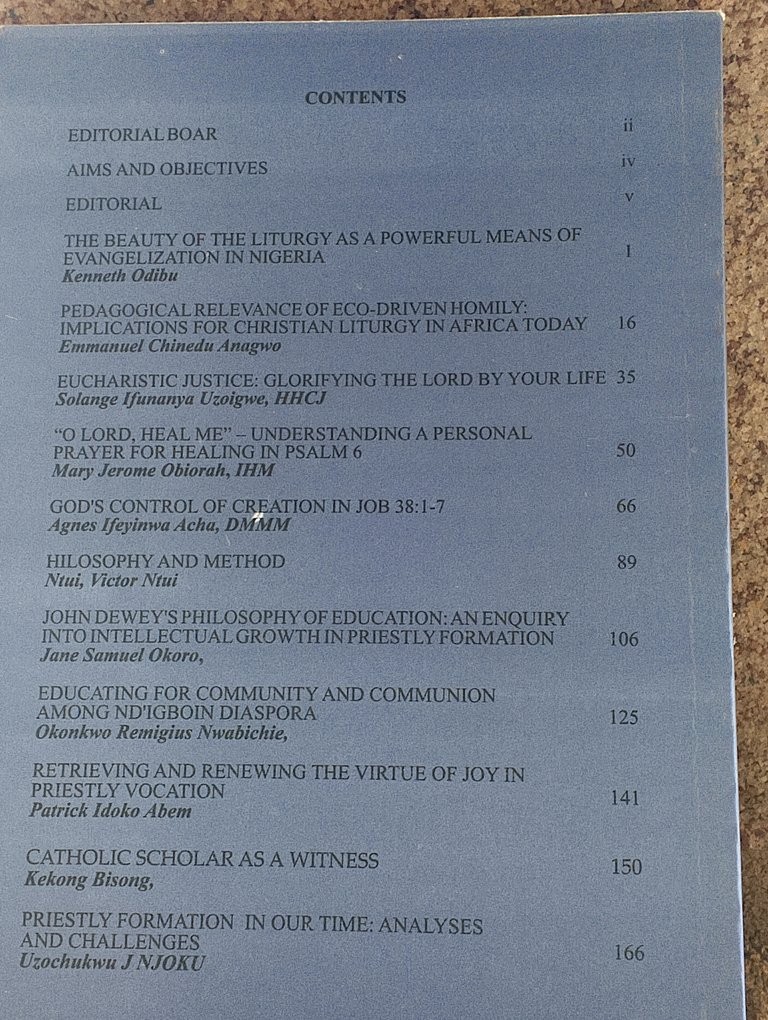
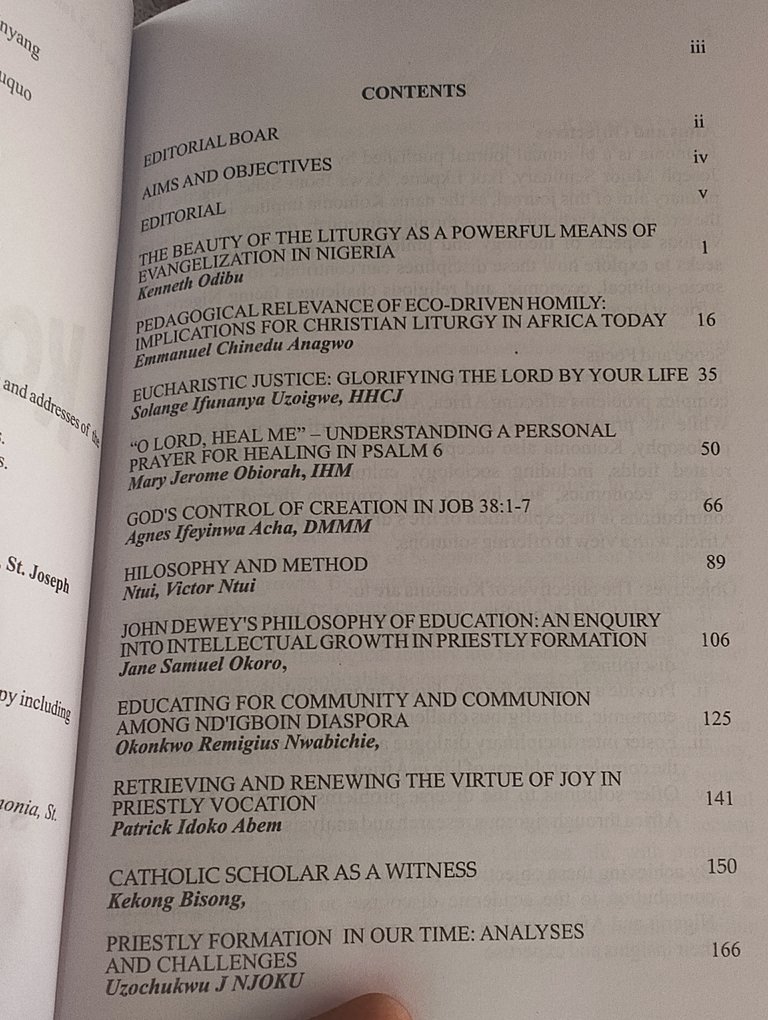
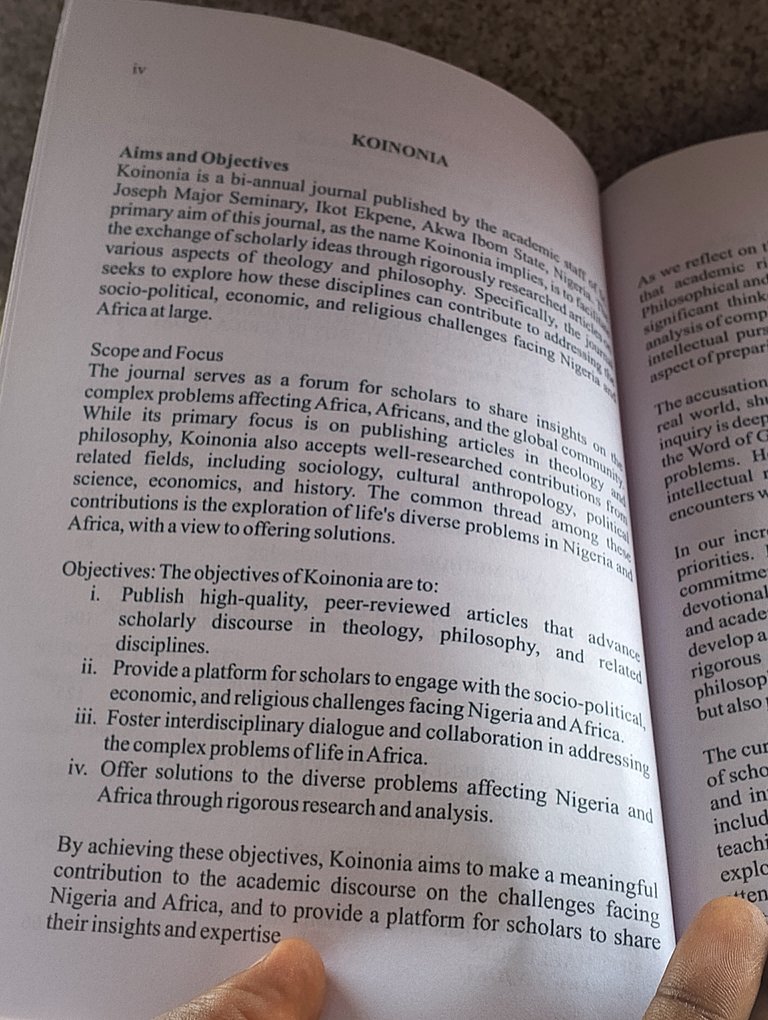
Koinonia publicado por el Seminario Mayor San José, Ikot Ekpene
Conocí el libro Koinonia de una manera muy sencilla pero que me marcó profundamente. Fue un domingo por la mañana en mi parroquia. Un seminarista del Seminario Mayor San José de Ikot Ekpene había venido a misa, no solo a participar sino también a hacer una pequeña presentación de un libro que estaban vendiendo en el seminario. El título me llamó la atención desde el principio: Koinonia. No es una palabra que uno escuche todos los días. Sonaba a algo antiguo, tal vez griego, algo espiritual. Y me atrapó aún más la manera en que el seminarista hablaba de él, con un tono de paz y convicción. Como si él no solo lo hubiera leído, sino también vivido su mensaje.
Compré un ejemplar.
Desde las primeras páginas supe que no era un libro cualquiera. Aunque había sido escrito y publicado desde un seminario, no era solo para seminaristas. Había algo en la forma en que estaba escrito que lo hacía cercano, como si estuviera dirigido a todos los que forman parte de la Iglesia. Hablaba del corazón de la vida cristiana: la comunión. Pero no una comunión superficial, sino una comunión real, viva, comprometida. Un estilo de vida que nos llama a vivir unidos, a compartir, a perdonar, a ser verdaderos hermanos.
El libro es una colección de reflexiones y ensayos escritos por seminaristas y formadores del seminario. Algunos textos son más teológicos, otros más personales. Hay capítulos que analizan el concepto de koinonia desde las Escrituras, otros que lo presentan desde la vivencia comunitaria y la vida diaria en el seminario. Esa mezcla hace que el libro tenga equilibrio. No es aburrido ni demasiado académico, pero tampoco es superficial. Es un libro que se deja leer con el corazón abierto.
Uno de los textos que más me tocó hablaba de la dificultad de construir una verdadera fraternidad en comunidad. El autor, un seminarista, contaba cómo muchas veces fingimos estar bien con los demás, cuando en realidad hay envidia, celos, egoísmo. Él confesaba momentos en los que no había sido un verdadero hermano y cómo eso lo llevó a una lucha interna, al arrepentimiento y al deseo de cambiar. Eso me pareció tan real, tan humano. Todos hemos vivido algo parecido en nuestras familias, en nuestros grupos, incluso dentro de la Iglesia.
Otro capítulo que me impactó fue sobre la Eucaristía como centro de la koinonia. El autor hablaba de cómo el altar es el lugar donde Dios une a personas diferentes, con historias distintas, y las hace un solo cuerpo. Me hizo pensar en mi parroquia, en la diversidad de las personas que allí participan, y en cómo todos recibimos el mismo pan del cielo. Ese acto sencillo, el partir el pan, nos une más de lo que imaginamos.
La manera en que está escrito el libro es sencilla pero profunda. No es uno de esos libros que usa palabras rebuscadas para impresionar. Al contrario, su lenguaje es directo, lleno de sentido y fácil de entender. Sentí que cada reflexión era como una conversación entre hermanos en la fe. Me ayudó a preguntarme: ¿Estoy viviendo realmente en comunión con los demás? ¿O solo me conformo con saludar y seguir mi camino? ¿Estoy dispuesto a abrir mi corazón y dejarme tocar por los demás?
El libro también señala algo muy cierto: hoy en día muchas personas se aíslan. Aunque estemos rodeados de gente, a veces vivimos encerrados en nosotros mismos. Incluso en la Iglesia, hay quienes van a misa pero no se sienten parte de la comunidad. Koinonia nos desafía a cambiar eso. A no conformarnos con relaciones superficiales. A buscar una vida en común donde haya escucha, comprensión, apoyo, perdón y alegría compartida.
Cuando terminé de leerlo, sentí que no solo había leído un libro, sino que había recibido una invitación. Una llamada a vivir de otra manera. A estar más presente en la vida de los demás. Desde entonces trato de ser más atento en mi parroquia, de escuchar de verdad cuando alguien me habla, de saludar con una sonrisa sincera, de interesarme por quienes parecen estar en silencio o alejados. Koinonia me hizo ver que no se trata solo de estar en el mismo espacio, sino de estar realmente conectados, desde el corazón.
A veces, uno compra un libro por compromiso o por curiosidad. Pero esta vez, comprar Koinonia fue mucho más. Fue un regalo espiritual. Me hizo recordar que la vida cristiana no se trata solo de rezar o ir a misa, sino de compartir la vida, de ser comunidad. Y eso empieza con pequeños gestos diarios. Con elegir amar, aunque no siempre sea fácil. Con perdonar, incluso cuando cuesta. Con acompañar al que sufre. Con celebrar con alegría los momentos buenos.
Recomiendo este libro a cualquiera que tenga sed de una fe más auténtica. No importa si eres joven o adulto, laico o religioso. Koinonia tiene algo para todos. Es un recordatorio de lo que significa ser Iglesia. Una Iglesia que no se construye con ladrillos, sino con corazones unidos.
Estoy agradecido con aquel seminarista que vino a mi parroquia. No solo me vendió un libro. Me dio una semilla. Una palabra que sigue creciendo en mí. Una palabra que hoy se ha convertido en estilo de vida: Koinonia.